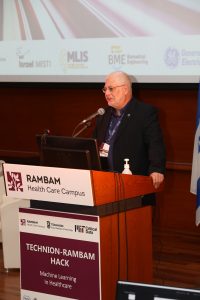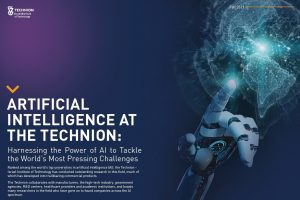The Digital Health Revolution
Technion and Rambam Inaugurate a New Center for Artificial Intelligence in Healthcare
The Technion and Rambam Health Care Campus are setting up a new joint Technion-Rambam Center for Artificial Intelligence in Healthcare (CAIH) that will signal a revolution in medical decision-making. The CAIH, the first joint academic-hospital AI center in Israel and one of the first in the world, will develop advanced artificial intelligence systems to analyze a patient’s condition. The center will focus on developing tools that will help physicians select, in real time, the most appropriate and accurate medical treatment for a patient. These tools will be based on a complex and rapid analysis of all the relevant medical information that has accumulated in big medical databases over the years. In the words of Assistant Professor Joachim Behar, co-director of the center, the aim of the CAIH is to “create the leading Israeli academic center for medical AI committed to advanced medical and clinical research, resulting in significant and actionable benefit to patient care.”
The Center’s opening conference, “Technion-Rambam Hack: Machine Learning in Healthcare,” which was held at Rambam Health Care Campus on March 9, was attended by about 250 people, and featured leading researchers from the Technion, Rambam, the Massachusetts Institute of Technology (MIT), the Ministry of Health, Clalit Health Services, GE Healthcare, and Roche. Scientists, healthcare practitioners and policy makers from all around the world shared their knowledge on the fascinating topic, while student teams attempted to tackle salient issues in healthcare by technological means. The opening remarks were delivered by Technion President, Professor Uri Sivan and the CEO of Rambam, Professor Miki Halberthal. A roundtable on the topic of data stakeholders was moderated by Professor Rafi Beyar, former director of Rambam Health Care Campus, and one of the visionaries behind the new center.
“It is very exciting to be here,” said Technion President Prof. Uri Sivan. “When I took office as President of the Technion more than two years ago, we built a strategic plan. The first initiative that came out of the program was the ‘Human Health Initiative,’ of which the new Center for Artificial Intelligence in Healthcare is a part. The connection between the Technion and Rambam is a key element in this vision of cooperation and connection between science, engineering, and medicine, and it combines two strong and important forces. 170 faculty members at the Technion are currently working on issues related to the life sciences, and I have no doubt that there is enormous potential here.”

President of the Technion, Prof. Uri Sivan, at the conference [photo courtesy of Rambam Health Care Campus]
The first part of the conference dealt with current trends in machine learning in healthcare, the second part on access to medical databases in Israel, and the third part on the prospective evaluation of machine learning models in the clinical environment. The conference was organized by Dr. Joachim Behar from AIMLab, Dr. Danny Eytan, Dr. Ronit Almog, and Prof. Leo Anthony Celi, who delivered the keynote address.
Prof. Leo Anthony Celi, is a senior researcher and director of the MIT Laboratory of Computational Physiology (LCP), the organization behind SANA, which supports technological innovation for the benefit of all mankind, including developing countries. Prof. Celi is a founder of MIMIC – a database serving more than 2,000 researchers in around 30 countries, creating a global community of medical researchers in the field of medical data science.
Prof. Ran Balicer is Chief Innovation Officer at Clalit Health Services, founding director of the Clalit Research Institute, a member of the Management Team for Epidemics in the Ministry of Health, and Head of the National Covid-19 Experts Advisory Team. He spoke at the conference on ways to harness data science to improve medical care. “Data science is expected to revolutionize the medical world,” said Prof. Balicer, “and there is no doubt that big data is a huge opportunity; however, as information accumulates, we understand that the key question is not how much information you have but how much knowledge it gives you, what significant insights you can gain from it and how you can incorporate it into improving medical care. In a nutshell, this revolution has taken responsive medicine for a single patient to predictive, proactive, and preventive medicine for everyone. This is no longer science fiction and we started working on it more than a decade ago. Today we are already making such predictions, and the COVID pandemic has accelerated this, of course.”
Prof. Shie Mannor is from the Andrew and Erna Viterbi Faculty of Electrical and Computer Engineering and considered one of the world’s leading experts in artificial intelligence. He is also co-director of MLIS – the Center for Machine Learning and Intelligent Systems at the Technion – and a senior scientist at NVIDIA. Prof. Mannor said, “in general I am a pessimist and skeptical of the promises made in the context of artificial intelligence, but in the medical world I believe that there is, and will be, significant progress based on AI. Of course, I also have warnings: it takes time to apply artificial intelligence, and the big challenge is not writing articles but bringing real applications to the field. In this sense, doctors have a significant role to play, and only they know what is really needed, and we researchers need to help develop systems that will work in the real world.”
The Technion-Rambam Center for Artificial Intelligence in Healthcare is the brainchild of the two institutions and jointly funded by both. It will operate initially in the Meyer Building in Rambam and will later be transferred to the newly built Discovery Tower on the western campus of the hospital. “The Center will start running five flagship projects, and its directors are Assistant Prof. Joachim Behar (head of the group), Assistant Prof. Uri Shalit, Prof. Shie Mannor, Prof. Lior Gepstein, Prof. Shai Shenn-Orr, Assistant Prof. Danny Eytan, Dr. Ronit Almog, and Dr. Oren Caspi.”
The Center is expected to bring about a dramatic change in the way patients are diagnosed and treated in real time. According to Assistant Prof. Uri Shalit of the Technion, “The Center will serve as a significant collaborative platform that will connect doctors and researchers from Rambam with scientists and engineers from the Technion, with the aim of promoting diagnosis and medical treatment through artificial intelligence. We, as data scientists, need large amounts of curated data – Big Data – and the clinical world needs experts who will analyze this data and derive useful insights from it. For us as scientists, this is an important connection to the field and a significant means of influencing human well-being.”

Prof. Rafi Beyar (left), Prof. Lior Gepstein, Technion President Prof. Uri Sivan, and Prof. Joachim Behar (right) – photo courtesy of Rambam Health Care Campus
“This is the great innovation,” said Dr. Oren Caspi, Director of the Heart Failure Unit at Rambam, a researcher at the Rappaport Faculty of Medicine at the Technion, and one of the leaders in establishing the Center. “We all know the usual procedure – the patient is hospitalized, undergoes diagnostic tests, and receives treatment to the best abilities of the medical staff. The new vision presented by the Center is one of diagnosis and treatment based on extensive information from a huge number of patients. As a result, the doctor will be able to ‘tailor’ the patient’s treatment to be optimal, accurate, and customized. The Center’s uniqueness will help us convert academic achievements in artificial intelligence and big data into therapeutic tools that are immediately available at the patient’s bedside in the spirit of personalized medicine.”
The conference summarized the results of a “Datathon,” an information-based competition held last week at the Technion Faculty of Biomedical Engineering. The conference was attended by around 50 students and alumni from various Technion faculties who developed different technologies related to the analysis of medical data in solving important challenges in cardiology, fetal monitoring, intensive care, and stem cells. The students were accompanied by 20 mentors from the Technion, Rambam, and industry.




